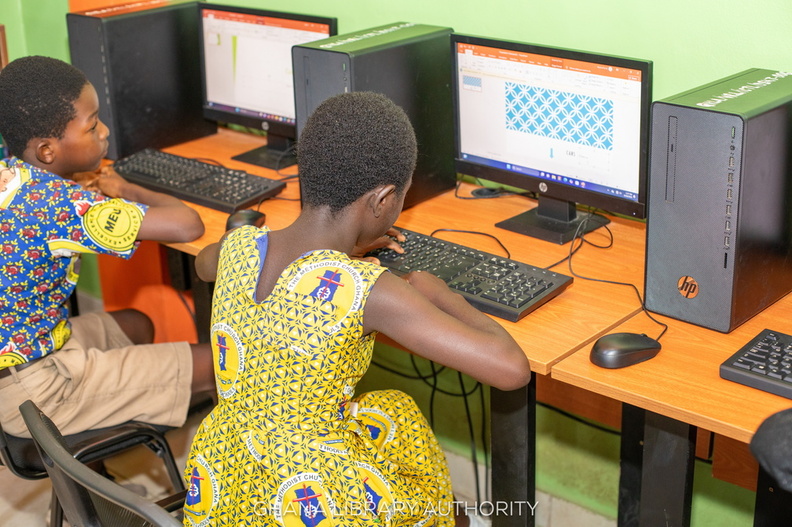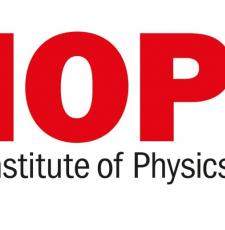
"I always wanted to learn coding and programming because I dream of creating my own video game. When I got the chance to attend the digital learning workshop in the library I learned those skills, and now I practice at home and in the library to make my dream come true,” said a junior high school student from Volta Region in Ghana.
This student is one of a new generation of computer whizzes growing up in Volta Region, thanks to in-depth digital learning workshops offered by Volta Regional Library. Through these workshops learners acquire skills ranging from the most basic - manipulating the mouse and using the keyboard - to understanding and using more complex applications for creating and editing text, presentations and spreadsheets, communications, coding and design, including Microsoft Word, Excel, PowerPoint, Canva, Wix, Python, Scratch and others.
"I learned how to type and how to create a Gmail account. At first, I found it difficult to type and didn’t know how to position my hands on the keyboard, but now I’m used to it. I want to become a teacher in the future, and I know I will use computers to research new ways of teaching," said another student.
“I have learned how to use Microsoft PowerPoint for presentations. At first, I didn’t know how to use many of the PowerPoint features, but now I’ve become good at it. I even downloaded PowerPoint on my phone, and on Saturdays I go to the library to read computing books so I can keep improving,” said a learner of more advanced skills.

Reaching students across the country
Volta Regional Library, in Ho, capital of Volta Region, is one of 15 regional and branch libraries across Ghana that are taking part in the Digital Learning @ Ghana Public Libraries project, a partnership between EIFL, the Ghana Library Authority (GhLA) and the US non-profit, TechSoup.
Over the past 12 months, the 15 public libraries have organized in-depth learning workshops and awarded certificates of completion to 1,666 students. Each workshop comprises several interactive learning sessions in the library, and takes from four to six weeks to complete. The workshops are conducted by librarians and library ICT coordinators who have undergone facilitation skills training provided by the project. The facilitators introduce the school students to free and open educational resources (OERs) in different learning formats - tutorials, videos, games and online courses.
The OERs are central to the library workshops: they are accessible and affordable; they offer opportunities for theoretical and practical learning, and librarians can adapt them to meet workshop participants' knowledge and skills levels. The most popular subjects chosen by students have been introduction to digital devices, basic computer software (Word, Excel, PowerPoint), internet search, digital reading, online safety, graphic design, coding and web development. Students who complete the full four to six weeks are awarded certificates.
Our post-training survey of learners (428 respondents) found that the libraries’ workshops are benefiting students in different ways. They are boosting skills and confidence, and the students say they are now more comfortable using the internet. The most common benefit reported was, ‘learning new things’, and many students also said that the workshops had made their leisure time more meaningful and helped them to perform better at school.
Library ICT resources supporting classroom learning
The workshops are also making an impression with school teachers and parents: "The digital learning workshops have given them access to tools that we don’t have in our schools, and this has really boosted their confidence. We can see that confidence carrying over into the classroom," said Christoper Tsinyo Ra-Brave, head teacher at A.M.E Zion Basic School in Ho.
And the workshops are transforming how communities and the students are interacting with their libraries: "I am especially proud of how the children have embraced the library. After school, many of them come directly here - some even stop by on their way home, and their parents pick them up from the library. They love spending time in our space, engaging with our staff and learning together. We have been able to connect with many schools through these workshops, and teachers now rely on us for digital learning resources, and this has even encouraged new schools to join our programme,” says Bright Orfori, Director of Volta Regional Library.
The Digital Learning @ Ghana Public Libraries project is funded by the Internet Society Foundation’s Strengthening Communities/Improving Lives and Livelihoods (SCILLS) grant programme. The project has trained 30 library staff (librarians and ICT coordinators) to become digital skills trainers, enabling 15 regional and branch libraries to become digital learning hubs. In addition to organizing in-depth digital skills workshops in libraries, completed by 1,666 students, the skilled library staff have conducted short classes in schools across the country, reaching more than 16,000 students aged from 12 to 18.
SHARE / PRINT









